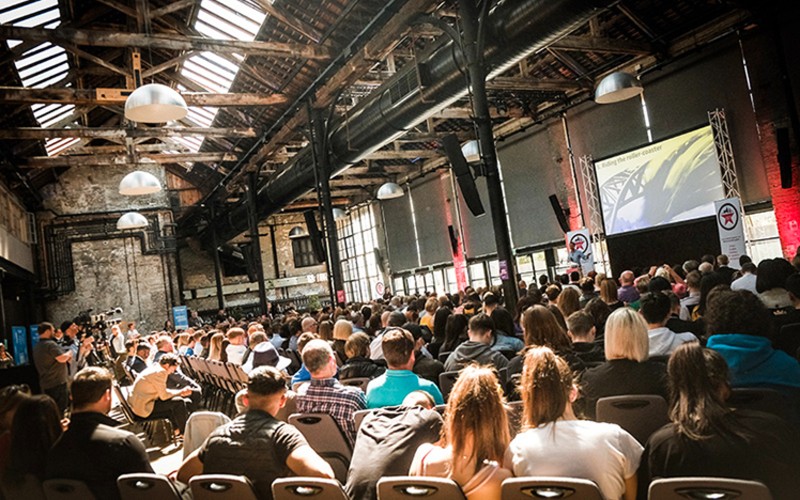Corporate events are big business. Of course, there are plenty of different types of events that fall under this umbrella of ‘corporate events’. It might be an organisation’s end of year awards gala dinner, a trade show for key clients, or an away day for employees and their families.
Whatever it is, if you are responsible for organising it, then make sure you check out our top 10 tips for corporate event management below, which will surely help you when the time comes.
Define the concept & know your audience
We’ve just mentioned the variety of events that can be classed as ‘corporate events’, and with this in mind, it is imperative from the very start that you define your concept, think about the message you are trying to get across, and some ideas around a theme. Also, know your audience! If it’s an internal event, then things can be more relaxed. If your corporate event is aimed at major clients and shareholders in the business, then formality and professionalism should be the order of the day.
Begin early
Not just for corporate events, but actually for any type of event planning, always begin your planning as early as possible. Time is always at a premium, and you’ll be amazed at how much time disappears the closer your event date becomes! Never leave things until the last minute – OK, so there will always be things that need sorting in the days and even hours before the event when things don’t go 100% according to plan. However, the more time you can give yourself, the less stress you will find yourself under, and the clearer and easier your decision-making will be.
Delegate roles and responsibilities
The art of delegation is a skill. Of course, the number of people in your team who are involved in the planning of the corporate event will no doubt be dictated by the size of the actual event. Don’t try to do everything yourself – you will end up a nervous wreck, and potentially spread yourself too thin, meaning that whilst lots of things get done, they perhaps don’t get done to the best of your ability. Have a trusted team around you, with people who will bring different skills to the table. Whilst you might provide the creative juices, you’ll definitely need people within your team who are practical and organised, who can execute the plans with confidence.
Draft a plan and follow the timeline
Talking about plans, it’s crucial that you have one, along with timescales and deadlines for your team to work towards. Share the plan, discuss it, and regularly bring the team together either face-to-face or on virtual meetings to check on progress. Everyone likes to know what’s going on, and having this plan will help to keep everyone involved on the right track.
Negotiate
Don’t be afraid to put your negotiating hat on and try to save a few quid from the budget. No doubt you’ve got your budget and are sticking religiously to it – if not, then you need to be! It’s a competitive market out there, and so ask about price – it’s amazing what savings you can make!
Have a plan B
Things NEVER go according to plan 100%, and so always have a contingency in place for when this happens. Of course, the detail in your planning will go some way to minimising the chances of things going wrong, but when they do, don’t panic – think clearly and find a solution, as there’s always a way around any problem!
Work with trusted suppliers
If you’ve been in the business of corporate event management for a while, then you’ve probably got a little black book of trusted suppliers, contactors and contacts that you can call, and who you have confidence in. This counts for a lot. Due to the temporary nature of corporate events, there is often a lot of corporate event equipment hire that is needed, from AV equipment and catering, through to event furniture and corporate event bar hire, to name just a few. If you are new to the game, then do your research for hire businesses who can provide what you need – there’s plenty of choice out there, with easyEventhireUK being just one example of a nationwide company that specialises in this type of event equipment rental.
Have a rehearsal
If possible, have a rehearsal the morning of your event or even the day before just to run through the timings, and to ensure that everyone involved in the event knows what is expected. Of course, you may well not have the time to do this, in which case, fasten your seatbelt and enjoy the ride!
Make yourself indispensable!
For many people organising corporate events for organisations, it’s not their full-time job. However, by doing a good job, you can make yourself indispensable, and even carve yourself a new niche in the company if it’s something that you want to do more of!
Enjoy the event!
And, ultimately, enjoy the event. There’s hours and hours of planning and hard work gone into your event, and so it’s only right that you should reap the rewards. Remember to take lots of photos for your company newsletter, website and social media channels and make a real splash about it. You’ll be able to gauge the success of your corporate event by the smiles on people’s faces!
So, hopefully, these top tips will help you when the time comes to organise your corporate event. We wish you lots of luck – go smash it!

